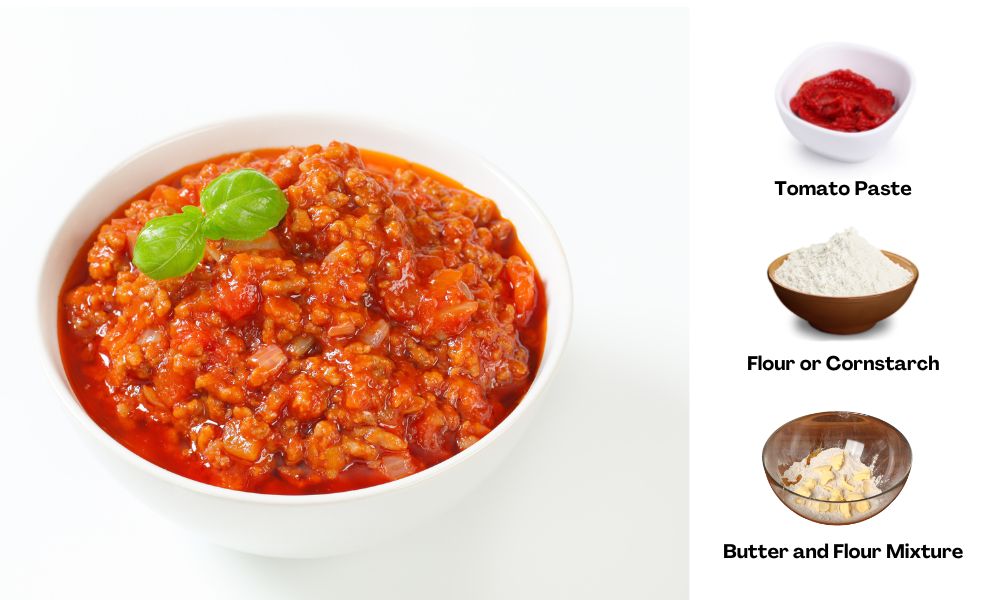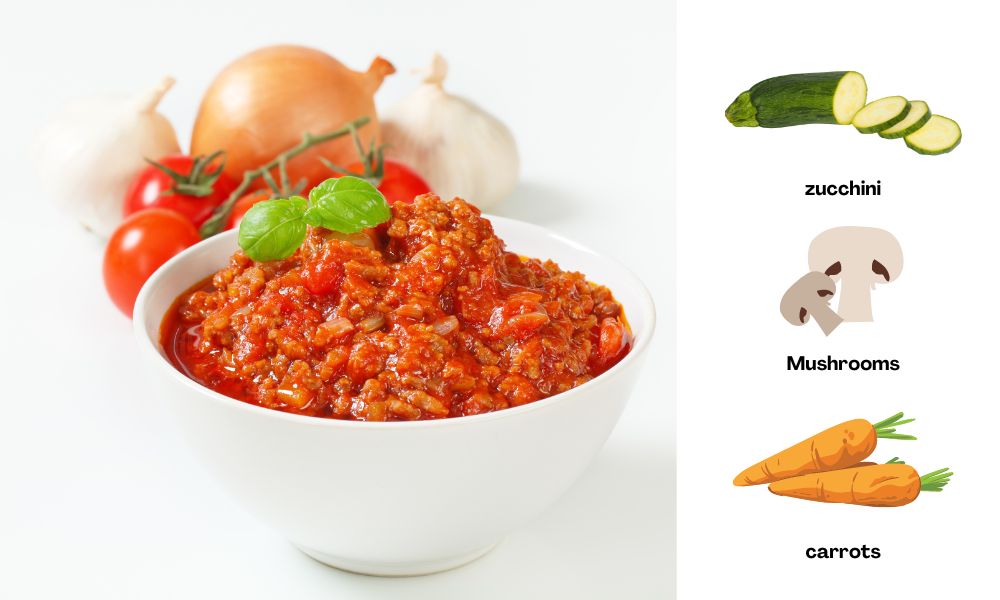There’s nothing more satisfying than a plate of spaghetti topped with a thick and rich bolognese sauce. A well-textured sauce is the key to bringing out the flavors of this classic Italian dish.
In this guide, we’ll uncover the secrets to perfecting the consistency of your bolognese sauce, making every bite a symphony of flavors.

Understanding Bolognese Sauce
A brief history of bolognese sauce
The origins of bolognese sauce can be traced back to the 18th century. Over the years, this sauce has evolved, incorporating various ingredients and techniques, resulting in the rich and complex sauce we know today.
The traditional ingredients in bolognese sauce
Bolognese sauce is typically made with ground meat, tomatoes, onions, carrots, celery, garlic, wine, and a variety of herbs and spices. The choice of ingredients and their ratios can significantly impact the final texture and flavor of the sauce.
The role of texture in bolognese sauce
The texture of bolognese sauce is crucial for creating an enjoyable eating experience. A thick, velvety sauce will coat the pasta evenly and deliver a burst of flavor with every bite.
Common Reasons for Thin Bolognese Sauce
- Insufficient cooking time
- Too much liquid
- Inadequate ingredient proportions
How to Thicken Bolognese Sauce

1. Cook it Low and Slow
The Science Behind Slow Cooking
Slow cooking is a technique that allows flavors to meld and develop over time. It also breaks down tougher connective tissues, resulting in a thicker, more unctuous sauce.
The Benefits of Slow Cooking for Bolognese Sauce
By cooking your bolognese sauce low and slow, you’ll give the flavors time to develop and the ingredients to meld together. This process results in a richer, deeper taste, and a thicker consistency.
2. Reduce the Liquid
How Reducing Works
Reducing a sauce means simmering it until excess liquid evaporates, concentrating the flavors and thickening the texture.
Tips for Effective Liquid Reduction
- Use a wide, shallow pan to increase the surface area for evaporation
- Stir frequently to prevent scorching
- Be patient and allow the sauce to reduce at a gentle simmer
3. Add a Thickening Agent

01 Tomato Paste
How Tomato Paste Works as a Thickener
Tomato paste is made from concentrated tomatoes, which have a naturally thick consistency. Adding it to your bolognese sauce helps to thicken the mixture while also enhancing the flavor.
The Correct Amount of Tomato Paste to Add
Start by adding 2-3 tablespoons of tomato paste to your sauce, then taste and adjust as needed. Be careful not to add too much, as it can overpower the other flavors.
02 Flour or Cornstarch
The Science Behind Starch-Based Thickeners
Flour and cornstarch are both starch-based thickeners that work by absorbing liquid and expanding, creating a thicker consistency in your sauce.
How to Properly Incorporate Flour or Cornstarch into the Sauce
To avoid lumps, mix the flour or cornstarch with a small amount of cold water to form a smooth slurry. Then, slowly whisk the slurry into the simmering sauce until the desired thickness is achieved.
03 Beurre Manié (Butter and Flour Mixture)
The Classic French Technique
Beurre manié is a French technique that involves combining equal parts softened butter and flour, then kneading the mixture into a smooth paste.
How to Make and Use Beurre Manié
To make beurre manié, mix equal parts softened butter and flour until a smooth paste forms. Gradually whisk small amounts of the paste into your simmering bolognese sauce until the desired thickness is reached.
4. Use Vegetables

How Vegetables Can Naturally Thicken the Sauce
Some vegetables, when cooked down, can release their natural pectin, which acts as a thickening agent in your sauce.
The Best Vegetables to Use for Thickening
Mushrooms, carrots, and zucchini are all excellent options for thickening your bolognese sauce while also adding extra flavor and nutrition.
5. Add Bread Crumbs or Grated Parmesan
How Bread Crumbs and Parmesan Contribute to Thickness
Bread crumbs and grated Parmesan are two popular ingredients that can help thicken bolognese sauce while adding depth and flavor. Both ingredients absorb excess liquid and contribute to the overall richness of the sauce.
Tips for Incorporating These Ingredients
To incorporate bread crumbs or grated Parmesan into your bolognese sauce, follow these steps:
- Gradually add the desired amount of bread crumbs or grated Parmesan to the sauce, stirring well to ensure even distribution.
- Allow the sauce to simmer for a few minutes after adding the ingredients. This will give them time to absorb the excess liquid and thicken the sauce.
- Taste the sauce and adjust seasoning if necessary. Keep in mind that adding Parmesan will increase the saltiness of the sauce, so you may need to adjust other seasonings accordingly.
6. Use a Food Processor or Immersion Blender
How Blending Can Change the Texture of the Sauce
Blending a portion of the bolognese sauce can help thicken it by breaking down larger ingredients and creating a smoother, more cohesive texture.
The Pros and Cons of Using a Blender
Using a food processor or immersion blender can be an effective method for thickening bolognese sauce, but it’s essential to consider the potential downsides:
Pros:
- Creates a smoother, creamier texture
- Breaks down larger ingredients that might not cook down naturally
Cons:
- Alters the traditional texture of bolognese sauce
- May over-process some ingredients, resulting in a less authentic flavor
7. Adjust Your Ingredient Ratios
Reevaluating Your Bolognese Sauce Recipe
Sometimes, the issue with a thin sauce lies in the ingredient ratios. Reevaluating your recipe and adjusting the proportions can help you achieve the desired thickness.
Balancing Ingredients for Optimal Thickness
Consider the following tips when adjusting your ingredient ratios:
- Use a higher ratio of meat to liquid for a thicker sauce.
- Reduce the amount of wine or broth used in the recipe.
- Increase the amount of tomato paste or crushed tomatoes to create a more robust, thicker sauce.
What are some common mistakes to avoid when thickening bolognese sauce?
To avoid common mistakes when thickening bolognese sauce, make sure to:
- Cook the sauce slowly over low heat for an adequate amount of time, allowing it to thicken naturally.
- Avoid adding too much liquid in the initial stages of cooking, as this can lead to a thin sauce.
- If using a thickening agent, such as flour or cornstarch, be sure to mix it with a small amount of cold liquid before adding it to the sauce to avoid lumps.
- Don’t overuse thickening agents, as this can affect the flavor and texture of the sauce.
- Be patient and allow the sauce to simmer and reduce to your desired thickness, rather than trying to rush the process.
Conclusion
The importance of a well-textured bolognese sauce cannot be understated. Achieving the perfect thickness for your sauce is a matter of experimentation and personal preference. By applying the techniques outlined in this guide, you’re sure to create a bolognese sauce that’s rich, flavorful, and perfectly suited to your taste.
For more thickening techniques, check out our guides on how to thicken chili and how to thicken alfredo sauce.
FAQs
What are the key ingredients in a traditional bolognese sauce?
Traditional bolognese sauce typically includes ground meat (such as beef or pork), onion, carrot, celery, tomatoes, tomato paste, white wine, and milk or cream. Seasonings like salt, pepper, and bay leaves are also commonly used.
How long should bolognese sauce be cooked to achieve the desired thickness?
Bolognese sauce should be cooked for at least 2 to 3 hours on low heat to achieve the desired thickness. Slow cooking helps the flavors meld and the sauce to thicken naturally.
Is it necessary to use a thickening agent in bolognese sauce?
It’s not always necessary to use a thickening agent, as slow cooking and reducing the liquid can often produce a thick sauce. However, thickening agents like tomato paste, flour, or cornstarch can be used to adjust the sauce’s consistency if needed.
Can I thicken bolognese sauce without altering its flavor?
Yes, you can thicken bolognese sauce without altering its flavor by reducing the liquid through simmering or using a thickening agent that doesn’t significantly impact the taste, such as a small amount of cornstarch.
Which vegetables are best for thickening bolognese sauce?
Vegetables like finely chopped mushrooms, grated carrots, or zucchini can help thicken bolognese sauce while adding extra nutrients and flavor.
How can I rescue a bolognese sauce that has become too thick?
If your bolognese sauce becomes too thick, you can thin it out by adding small amounts of liquid, such as water, broth, or tomato sauce. Be sure to add the liquid gradually, stirring and allowing the sauce to simmer until it reaches your desired consistency.








